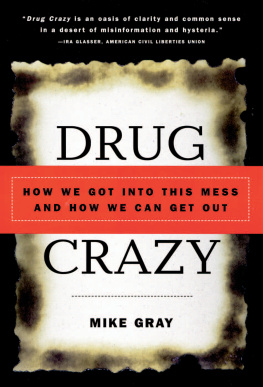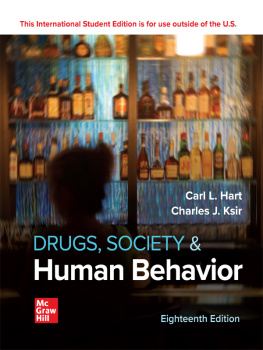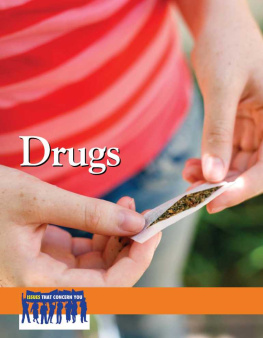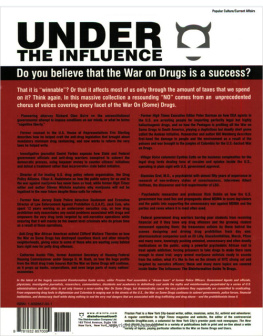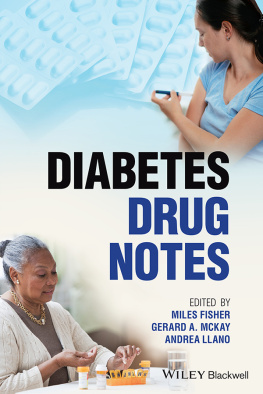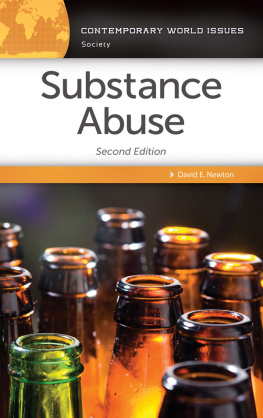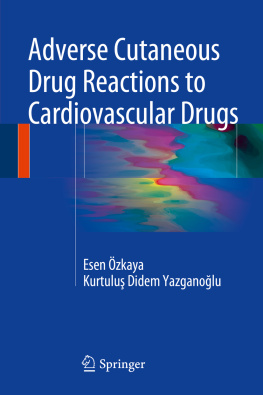More Praise for Drug Crazy
"A rip-tearing, screen-worthy read full of narco raids and shootouts."
High Times
"Never did I think one could learn so much about the drug crisis all in one place. Mike Gray has written a book of profound compassion that, nevertheless deals intelligently with the facts. Drug Crazy is an antidote for passivity."
Daniel Schorr
"What sets Drug Crazy apart is Grays ability to bring this sordid history to life. He combines a mastery of narrative with a chilling soberness of purpose."
Paul Rosenberg,
Intellectualcapital. com
"Gray's analysis is, of course, controversial. It is, however, argued eloquently and persuasively, and deserves a hearing."
Kirkus Reviews
Over the last fifteen years, American taxpayers have laid out over $300 billion to wage the war on drugsthree times what it cost to put a man on the moon. Drug Crazy offers a scathing indictment of our expensive and hypocritical follies, which have essentially benefited only two classes of people: professional anti-drug advocates and drug lords. Mike Gray has launched a frontal assault on Americas drug war orthodoxy, and his disturbing overview of the battlefield makes it clear this urgent debate must begin right now.
Mike Gray, author of the China Syndrome, has produced the award-winning documentaries American Revolution and The Murder of Fred Hampton. He has written for numerous publications, including The Nation, The Los Angeles Times, and Rolling Stone.
DRUG CRAZY
Drug Crazy
How We Got into this Mess and How We can Get Out
Mike Gray
Routledge
New York
Paperback edition published in 2000 by
Routledge
270 Madison Ave,
New York NY 10016
Transferred to Digital Printing 2010
Originally published in hardcover by Random House, Inc.
Copyright 1998 by Mike Gray
All rights reserved. No part of this book may be reprinted or reproduced or utilized in any form or by any electronic, mechanical, or other means, now or hereafter invented, including photocopying and recording, or in any information storage or retrieval system, without permission in writing from the publisher.
10 9 8 7
Cataloging-in-Publication Data available from the Library of Congress
ISBN 0-415-92647-5 (pbk.)
Publisher's Note
The publisher has gone to great lengths to ensure the quality of this reprint but points out that some imperfections in the original may be apparent.
FOR P. N. HIRSCH,
a St. Louis merchant
who taught honesty by example
The night is far spent,
the day is at hand:
let us therefore cast off the works of darkness,
and let us put on the armour of light,
Romans, 13:12
Thanks first of all to my wife, Carol, and son, Lucas, who stuck by through thick and thin with invaluable criticism and advice. And to longtime friends Jim Dennett and Andy Davis who helped keep the project afloat at critical moments. Thanks as well to Bob Lescher and Bob Loomis for their guidance over the last six years. And to Marcia Litman Greene, and the staff at the UCLA Research Libraries and the Chicago Historical Society, my deep appreciation for their assistance. Invaluable aid was rendered by the U.S. Border Patrol, U.S. Customs, the Drug Enforcement Administration, the RAND Corporation, the White House Office of National Drug Control Policy, the United Nations International Narcotics Control Board, and the Government of the Kingdom of the Netherlands. And finally, my thanks to Sergeant Joe Kosala and Detective Frank Golf of the Chicago Police Department, a couple of honest cops trying to keep the lid on against impossible odds.
Contents
DRUG CRAZY
Chapter One
A Tale of Two Cities Chicago: 1995/1925
Goff is edgy about all the kids on the street. There are civilians all over the place and old folks on the porches even though it's been dark for hours. The temperature's barely into the fifties, but on the heels of a brutal winter in Chicago, any wind that's not from the north is an icebreaker.
Detective Frank Goff is in the backseat of a blue Chevy Suburban across from an aging brick six-flat on 113th Street. This is a lower-middie-class black neighborhood, mostly homeowners trying to keep their places up and not succeeding. The building Golf and his crew are watching is just a couple of blocks off State Street, "that Great Street," but when you get this far southand this late in the twentieth centuryit loses any resemblance to the boulevard of song and fable.
The van's windows are heavily tinted, but to be on the safe side Goff has added burlap curtains. He can still see through the mesh, but from the outside, the heavy cloth will shade any accidental kick of light from metallic objects. Scotty Freeman is at the wheel, and he's black, but Goff is staying out of sight, A white boy would look quite out of place around here. The two other guys on the crew, Fischer and Washington, are across the street in the vestibule of the six-flat. They're waiting for a coke dealer named Ramone.
It's been a long day. They started this morning cramped up in this same van, watching crack deals go down near a grammar school way out on the West Side. And that's what led them here. This elite team is with the school unit of the Chicago Police Department. It's Golf's job to make some kind of dent, however small, in the gang and narcotics activity that is devouring the city's school system. "To stop guns and narcotics around the school. That's our specific assignment. To get the drive-by shooters, to get the narcotics away from the schools."
Their target this morning was an enclave known as "K-Town' about fifteen miles northwest of here. Goff had been tipped that the area around the Marconi Grammar School was flooded with crack. He decided to drive a wedge in this operation. He got his team in position around 8:00 A.M., and what they saw over the next few hours would have left the average Chicagoan bug-eyed. But none of it was news to Goff. He sees this all the time. A car pulls up, a couple of guys get out, each one with a dozen "sixty-packs"sixty little vials of crack, about a fifth of a gram in each. These guys are the wholesalers. They round up their street dealers and front each one a single sixty-pack. When the street dealer sells out his supply at ten bucks a pop, he keeps one hundred dollars, turns the other five hundred over to the wholesaler, and gets another sixty-pack. If you hustle at this game, you can be the richest kid on the block.
These street dealers, of course, are all quite young. They have to be. In Illinois it's a Class X felony to sell drugs within one thousand yards of a school, a park, or a churchwhich covers most of the cityand that carries a mandatory six- to sixty-year sentence. But the maximum you can give a juvenile is thirty days in the Audy Home. Common sense dictates that the dealers would use these youngsters on the street and keep the adults out of sight. The youngest kid Goff spotted this morning looked to be about eleven. He was not a full-fledged dealer; he would just take over when one of the older boys went to take a piss or something. His main job was lookout. They paid him to ride his bike up and down the street watching for the "Five-oh!" (as in Hawaii Five-O).
As for the buyers in this open-air drug market, some of them were quite young as well. The youngest was probably in the fifth grade, but they weren't all schoolchildren. The oldest was in his seventies. There was a mailman, a CTA bus driver-they were white, black, Spanish, you name it. At one point Goff spotted a pregnant white lady carrying a baby in a papoose sling with a gallon of milk in one hand walking down the street. Goff said, "What the hell is she doing here?" She bought a ten-dollar hit.

